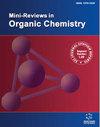靶向IL-1的抗炎生物碱对抗呼吸道病毒感染:对严重急性呼吸系统综合征冠状病毒2型药物开发的特别见解
IF 1.9
4区 化学
Q2 CHEMISTRY, ORGANIC
引用次数: 0
摘要
严重急性呼吸综合征冠状病毒2 (SARS-CoV-2)是导致COVID-19大流行的呼吸道病毒中最致命的病毒之一。病毒通过鼻腔传播,向下移动到气管、支气管,然后进入肺部。一旦在肺泡细胞内复制,SARS-CoV-2就会使肺泡囊的膜多孔,从而导致血浆从周围血管渗漏到肺泡囊中,导致肺泡囊积聚。这一过程导致感染部位的辅助t细胞产生促炎细胞因子,如白细胞介素-1β (IL-1β)和肿瘤坏死因子-α (TNF-α),导致呼吸困难。植物生物碱有望治疗病毒感染。植物对对抗单纯疱疹病毒(HSV)、人类免疫缺陷病毒(HIV)、乙型肝炎病毒(HBV)和导致人类呼吸道疾病的病毒等病毒的药物开发做出了贡献。植物生物碱主要通过靶向病毒的复制来治疗病毒性疾病,无论是提取物、输液还是粉末形式。生物碱如粉防己碱、氧化苦参碱和小檗碱已被证明在介导IL-1等促炎细胞因子方面具有积极作用。这些生物碱因此使核因子κ b (NF-kB)通路失活,抑制其靶基因IL-1β和TNF-α的表达。NF-kB的失活导致IL-1和TNF-α水平降低,从而减少炎症,减少免疫细胞的压力,提高患者抵抗感染的能力。尽管开发了针对SARS-CoV-2的疫苗,但该病毒不断演变成新品种,对人类构成威胁,因此有必要制定有效的药物开发计划。天然产品可以在这方面铺平道路。这一综述有助于开发针对SARS-CoV-2的更安全的药物,对抗这种病毒不断出现的变种的威胁。本文章由计算机程序翻译,如有差异,请以英文原文为准。
Anti-inflammatory alkaloids targeting IL-1 against Respiratory Viral infections: A Special insight into drug development against SARS-CoV 2
Severe acute respiratory syndrome coronavirus 2 (SARS-CoV-2) is one of the deadliest viruses among respiratory viruses which resulted in COVID-19 pandemic. The virus gets transmitted by the nasal route and moves down to the trachea, bronchi, and then to the lungs. Once replicated inside the alveolar cells, the SARS-CoV-2 makes the membrane of the alveolar sac porous, which causes the leaking of plasma from surrounding blood vessels into the alveolar sac leading to its buildup. This process results in the production of pro-inflammatory cytokines like interleukin-1β (IL-1β) and Tumor necrosis factor-α (TNF-α) by the helper T-cells at the site of the infection, causing difficulty in breathing. Plant-based alkaloids can be promising to treat viral infections. Plants have contributed to drug development against viruses like Herpes simplex virus (HSV), Human immunodeficiency virus (HIV), Hepatitis B virus (HBV), and viruses that cause respiratory diseases in humans. Plant alkaloids, either in the form of extract, infusion, or powder, have shown potential in treating viral diseases mainly by targeting the replication of viruses. Alkaloids like Tetrandrine, Oxymatrine, and Berberine have been shown to have a positive role in mediating pro-inflammatory cytokines like IL-1. These alkaloids thus inactivate the nuclear factor kappa-B (NF-kB) pathway, inhibiting the expression of its targeted genes, IL-1β and TNF-α. This inactivation of NF-kB results in reduced levels of IL-1 and TNF-α, and consequently reduced inflammation, decreasing the stress on the immune cells and increasing the ability of the patient to fight the infection. Despite vaccine development for SARS-CoV-2, the virus is continuously evolving into new varieties, posing a threat to humans and it is necessary to develop effective drug discovery programs. Natural products can pave the way in this regard. This review can contribute towards safer drug development against SARS-CoV-2, combating the threat of the ever-emerging variants of this virus.
求助全文
通过发布文献求助,成功后即可免费获取论文全文。
去求助
来源期刊
CiteScore
4.50
自引率
4.30%
发文量
116
审稿时长
>12 weeks
期刊介绍:
Mini-Reviews in Organic Chemistry is a peer reviewed journal which publishes original reviews on all areas of organic chemistry including organic synthesis, bioorganic and medicinal chemistry, natural product chemistry, molecular recognition, and physical organic chemistry. The emphasis will be on publishing quality papers very rapidly, without any charges.
The journal encourages submission of reviews on emerging fields of organic chemistry including:
Bioorganic Chemistry
Carbohydrate Chemistry
Chemical Biology
Chemical Process Research
Computational Organic Chemistry
Development of Synthetic Methodologies
Functional Organic Materials
Heterocyclic Chemistry
Macromolecular Chemistry
Natural Products Isolation And Synthesis
New Synthetic Methodology
Organic Reactions
Organocatalysis
Organometallic Chemistry
Theoretical Organic Chemistry
Polymer Chemistry
Stereochemistry
Structural Investigations
Supramolecular Chemistry

 求助内容:
求助内容: 应助结果提醒方式:
应助结果提醒方式:


